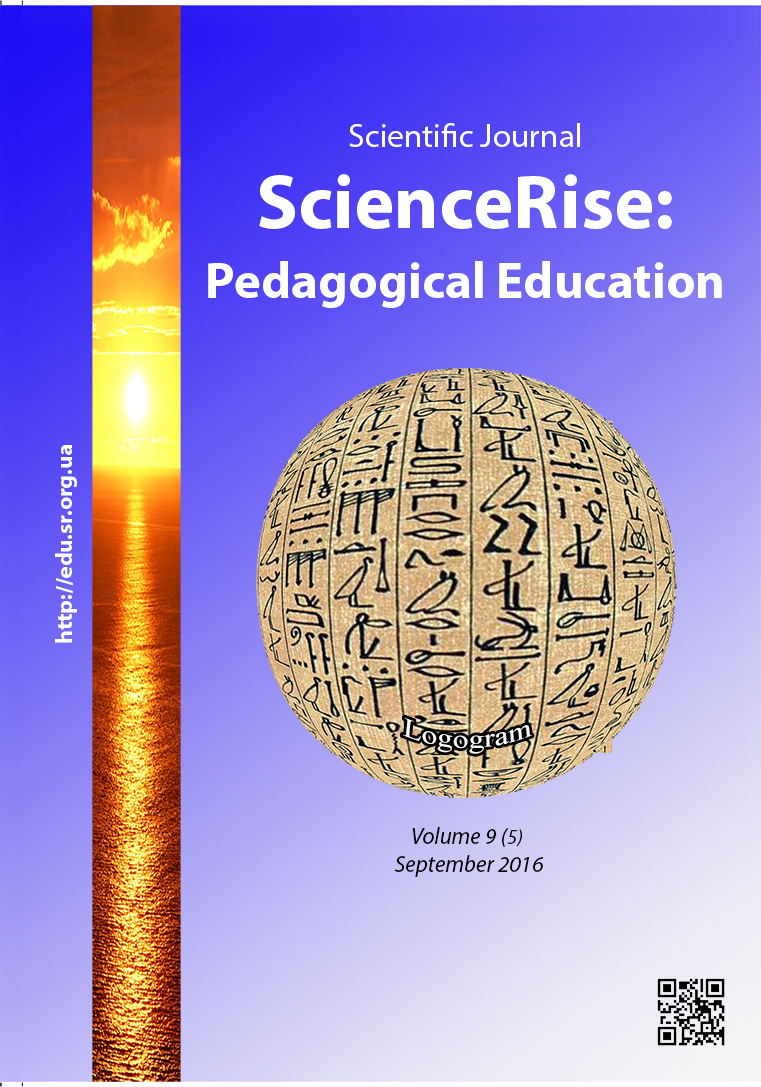Basis of socio-pedagogical conditions at training of future social workers to work patronage with the elderly
DOI:
https://doi.org/10.15587/2519-4984.2016.78747Keywords:
professional training, stages, socio-pedagogical conditions, social worker, patronage work, elderlyAbstract
The grounding of socio-pedagogical conditions in the process of professional training of the future social workers for patronage work with elderly was presented in the article. The fundamental studies as to professional training of future social workers were analyzed. Four socio-pedagogical conditions of training of social worker for this type of professional activity were determined and characterized: structural-content filing of the process of formation of readiness of the future social workers to patronage work with elderly; the use of interdisciplinary connections of the learning subjects at training of students; scientific-methodical support of the process of formation of the readiness of future social workers to the patronage work with elderly; organization of practical activity in the process of professional training of the future social workers for patronage work with elderly. The stages of professional training of the future specialists of social sphere on the background of aforesaid socio-pedagogical conditions were determined. The effectiveness of the offered socio-pedagogical conditions for the professional training of future social workers for the work with aforesaid category of people was proved. Their expedience in the process of mastering of the necessary knowledge, abilities and skills was grounded
References
- Karpenko, O. G.; Harchenko, S. Ja. (Ed.) (2007). Profesijna pidgotovka social'nyh pracivnykiv v umovah universytets'koi' osvity: naukovo-metodychnyj ta organizacijno-tehnologichnyj aspekty. Drogobych: Kolo, 374.
- Kaps'ka, A. J. (2011). Social'na robota. Kyiv: Vydavnychyj Dim «Slovo», 400.
- Mishhyk, L. I. (1997). Teoretyko-metodychni osnovy profesijnoi' pidgotovky social'nogo pedagoga u zakladah vyshhoi' osvity. Zaporizhzhja, 359.
- Zvjerjeva, I. D., Bezpal'ko, O. V., Harchenko, S. Ja. et. al.; Zvjerjevaja, I. D., Laktionova, G. M. (Eds.) (2003). Social'na robota v Ukrai'ni. Kyiv: Nauk. svit, 233.
- Zvjerjeva, I. D., Laktionova, G. M. (2004). Social'na robota v Ukrai'ni. Kyiv: 204.
- Arhypova, S. P., Majboroda, G. Ja. (2002). Social'na pedagogika. Cherkasy-Uzhgorod, 154.
- Mygovych, I. I., Zhmyr, V. F. (2007). Teoretychni zasady social'noi' roboty. Uzhgorod: Goverla, 410.
- Poltavec', V. (2000). Social'na robota v Ukrai'ni: pershi kroky. Kyiv: Vyd. dim «KM Akademija», 233.
- Semygina, T. V., Gryga, I. M. (Eds.) (2004). Social'na robota. Kyiv: Vyd. dim «Kyjevo-Mogyljans'ka akademija», 166.
- Alekseeva, L. S. (2000). Adresnyj social'nyj patronazh sem'i i detej. Moscow: Gos. NII sem'i i vospitanija, 160.
- Vajnola, R. H. (2009). Pedagogichni zasady osobystisnogo rozvytku majbutn'ogo social'nogo pedagoga v procesi profesijnoi' pidgotovky. Kyiv, 542.
- Kozubovs'ka, I. V., Dosin, A. R. (2008). Vykorystannja dosvidu Velykoi' Brytanii' u praktychnij pidgotovci fahivciv social'noi' roboty v Ukrai'ni. Pedagogichna nauka: istorija, teorija, praktyka, tendencii' rozvytku, 1. Avaialble at: http://intellect-invest.org.ua/pedagog_editions_e-magazine_pedagogical_science_arhiv_pn_n1_2008_st_29/
- Kuprijanov, B. V. (2006). Gipoteza kandidatskoj dissertacii (o mnogoobrazii pedagogicheskih uslovij). Nauka i praktika vospitanija i dopolnitel'nogo obrazovanija, 4, 100–108.
- Busel, V. T. (Ed.) (2005). Velykyj tlumachnyj slovnyk suchasnoi' ukrai'ns'koi' movy: 170000. Kyiv; Irpin': VTF «Perun», 1728.
- Kaspyna, V. A. (1970). O metodah vospytanyja y yh klassyfykacyy. Sovetskaja pedagogyka, 1, 84–94.
- Eroshyna, N. A. (2001). Dydaktycheskye uslovyja upravlenyja samostojatel'noj uchebnoj dejatel'nost'ju studentov pedagogycheskyh vuzov. Lypeck: LGU, 22.
- Boritko, N. M. (2001). V prostranstve vospytatel'noj dejatel'nosty. Volgograd: Peremena, 181.
- Larionova, N. B. (2010). Praktyka v systemi profesijnoi' pidgotovky studentiv special'nostej «Social'na pedagogika» i «Social'na robota». Lugans'k: Vyd-vo DZ «LNU imeni Tarasa Shevchenka», 69.
- Povidajchyk, O. S. (2007). Formuvannja informacijnoi' kul'tury majbutn'ogo social'nogo pracivnyka v procesi profesijnoi' pidgotovky. Ternopil', 20.
- Slastenin, V. A. (1993). Social'nyj pedagog i social'nyj rabotnik: lichnost' i professija. Teorija i praktika social'noj raboty: Otechestvennyj i zarubezhnyj opyt. Moscow; Tula, 265–274.
- Golubenko, T. O. (2014). Metod praktychnyh sytuacij v procesi roboty eksperymental'noi' studii' «Osnovy patronazhnoi' roboty z ljud'my pohylogo viku». Kyiv: NPU imeni M.P. Dragomanova, 45.
- Golubenko, T. O. (2014). Organizacija patronazhnoi' roboty z ljud'my pohylogo viku jak skladova praktyky studentiv special'nosti «Social'na robota»: osvitn'o-kvalifikacijnyj riven' «bakalavr». Kyiv: NPU imeni M. P. Dragomanova, 134.
- Golubenko, T. O. (2014). Osnovy patronazhnoi' roboty z ljud'my pohylogo viku. Kyiv: NPU imeni M. P. Dragomanova, 135.
- Golubenko, T. O. (2014). Tehnologii' social'noi' roboty z ljud'my pohylogo viku. Kyiv: NPU imeni M. P. Dragomanova, 163.
- Karpenko, O. G., Savel'chuk, I. B. (Eds.) (2013). Social'na robota: programy navchal'nyh dyscyplin special'nosti «Social'na robota» osvitn'o-kvalifikacijnogo rivnja bakalavr. Kyiv: NPU im. M. P. Dragomanova, 244.
Downloads
Published
How to Cite
Issue
Section
License
Copyright (c) 2016 Тетяна Олександрівна Голубенко

This work is licensed under a Creative Commons Attribution 4.0 International License.
Our journal abides by the Creative Commons CC BY copyright rights and permissions for open access journals.
Authors, who are published in this journal, agree to the following conditions:
1. The authors reserve the right to authorship of the work and pass the first publication right of this work to the journal under the terms of a Creative Commons CC BY, which allows others to freely distribute the published research with the obligatory reference to the authors of the original work and the first publication of the work in this journal.
2. The authors have the right to conclude separate supplement agreements that relate to non-exclusive work distribution in the form in which it has been published by the journal (for example, to upload the work to the online storage of the journal or publish it as part of a monograph), provided that the reference to the first publication of the work in this journal is included.







